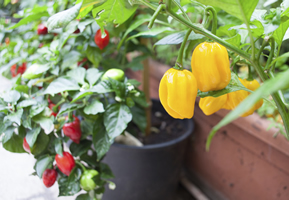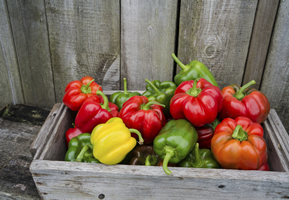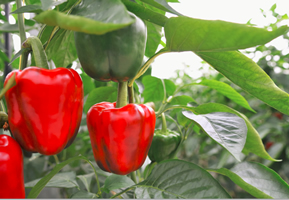A.Vogel search
When the internal search is activated, personal data such as your IP address is transmitted to our search engine Cludo. Data is thus transferred to a third country. Please click here if you want to display the internal search. You can find more information on data protection here: Privacy policy.
How to grow peppers
Peppers are not just a bright and colourful addition to a fruit or vegetable patch, they can provide you with a fresh supply of deliciously sweet and juicy fruit that can be added raw or cooked to a range of exciting dishes. Peppers support themselves well, and grow best in a warm and sunny spot. If you are trying to grow peppers in a colder part of the country, growing them inside a greenhouse may be the best option.
Choosing a plot
In Canada most people choose to plant peppers in a greenhouse, as this ensures that the temperature can be kept stable; at least 18ᵒC. Growing peppers in containers requires a little more attention than planting into the ground, but this is often better suited to the Canada climate.
If you are growing your peppers outside shelter your plants from wind. A warm sunny spot, such as at the base of a wall is good. The soil should drain well to avoid excess moisture causing the plants to rot.
Planting
 If growing in containers, once two leaves have formed, transplant into a pot about 8cm (3in) in diameter. Sowing can begin mid to late March, although the main month for sowing is throughout May. Don’t plant the seedlings more than 6mm (¼ in) into the soil, or the seedlings will struggle to grow.
If growing in containers, once two leaves have formed, transplant into a pot about 8cm (3in) in diameter. Sowing can begin mid to late March, although the main month for sowing is throughout May. Don’t plant the seedlings more than 6mm (¼ in) into the soil, or the seedlings will struggle to grow.
Wait until all danger of frost is past, and night temperatures are consistently above 7°C before transferring young plants to pots for the summer and setting them outdoors.
Nurturing
 It is important to keep your plants well watered, particularly in warm weather or if growing in a container, and it may be necessary to water them every day. When flowers begin to appear, begin to feed the plants with liquid feed, such as one suitable for tomatoes.
It is important to keep your plants well watered, particularly in warm weather or if growing in a container, and it may be necessary to water them every day. When flowers begin to appear, begin to feed the plants with liquid feed, such as one suitable for tomatoes.
Pepper plants are generally resistant to pests and diseases. However, they can be susceptible to aphids, although it is relatively easy to protect your plants by washing these off of the leaves. Other problems can arise if your plants are exposed to frost, so it is worth covering your plants if a late frost is expected.
Harvesting
 A productive plant will provide between 3 and 8 peppers. Peppers can be harvested once the fruit is green and glossy, but leaving the fruit on the tree will allow it to turn yellow, orange and then red. The fruit becomes sweeter the longer it is left on the tree; however, this does reduce the yield.
A productive plant will provide between 3 and 8 peppers. Peppers can be harvested once the fruit is green and glossy, but leaving the fruit on the tree will allow it to turn yellow, orange and then red. The fruit becomes sweeter the longer it is left on the tree; however, this does reduce the yield.
When harvesting peppers, cut the fruit from the branch using shears or a sharp knife as pulling the peppers off of the plant can break the branches. Peppers can be ready as early as August going through to September, depending on the variety of pepper and the type of weather during the growing season.
A.Vogel Blog – Natural and Healthy
Inspiration for a healthy life!




